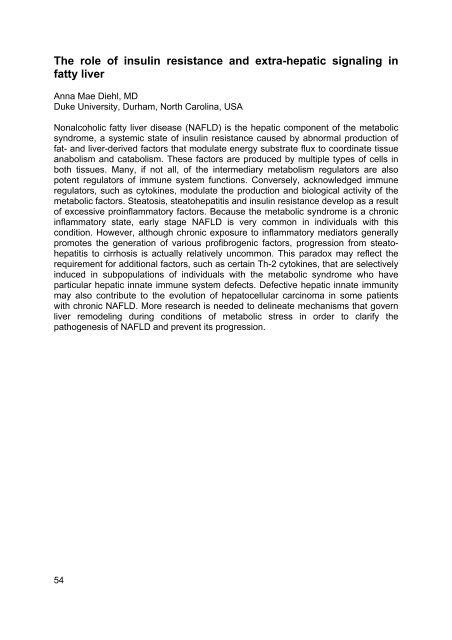- Page 1 and 2: BERLINAbstractsPoster AbstractsGAST
- Page 3 and 4: CONTENTSpageCholelithiasis and bili
- Page 5 and 6: Session Liver IDiagnosis and survei
- Page 7 and 8: Poster Abstracts1. Autoimmune pancr
- Page 9 and 10: 24. Liver vascular index in NASH, c
- Page 11 and 12: 47. Expression of claudins in human
- Page 13 and 14: 67. Prevalence and association with
- Page 15 and 16: 90. Ursofalk ® in cholestatic live
- Page 17 and 18: 112. Agrin accumulates in the liver
- Page 19: Molecular mechanisms controlling bi
- Page 22 and 23: Etiology and pathogenesis of biliar
- Page 25 and 26: Special Lecture IFuture development
- Page 27 and 28: Pancreatic carcinoma
- Page 29 and 30: 3. One pancreatic cancer case with
- Page 31 and 32: However, the Melanoma Genetics Cons
- Page 33 and 34: the pancreas encouraging duodenum p
- Page 35 and 36: Pancreatic cancer: Surgery, palliat
- Page 37 and 38: Special Lecture IIIDevelopment comp
- Page 39 and 40: Special Lecture IVHow does pancreat
- Page 41 and 42: Session Liver IDiagnosis and survei
- Page 43 and 44: Imaging modalitiesProf. Riccardo Le
- Page 45: Session Liver IIMetabolic liver dis
- Page 49 and 50: other adipocyte-derived factors, in
- Page 51 and 52: Hereditary hemochromatosis: The gen
- Page 53 and 54: Wilson disease: The impact of molec
- Page 55 and 56: Immune pathogenesis of hepatitis B
- Page 57 and 58: However, neither WHV DNA nor WHsAg
- Page 59 and 60: The well established antiviral ther
- Page 61 and 62: Genomics of hepatocellular carcinom
- Page 63 and 64: A prospective study of more than 22
- Page 65 and 66: treatment approach with HDACi toget
- Page 67 and 68: statistically significant differenc
- Page 69 and 70: Prof. Dr. H. FriessAllgemein-/Visze
- Page 71 and 72: Prof. Dr. W.E. SchmidtInnere Medizi
- Page 73 and 74: Autoimmune pancreatitis: An underdi
- Page 75 and 76: Non-invasive parameters for predict
- Page 77 and 78: Table 1Agegroups1986-1991m-w1992-19
- Page 79 and 80: NTCP-mediated bile acid transport i
- Page 81 and 82: 8The use of Ursofalk ® in patients
- Page 83 and 84: 10High expression of agrin in hepat
- Page 85 and 86: 12Chronic liver diseases associated
- Page 87 and 88: 14Determination of hepatitis Delta
- Page 89 and 90: 16Different expressions of claudins
- Page 91 and 92: For most of the morphological, hist
- Page 93 and 94: 19Clinical and diagnostic value of
- Page 95 and 96: The impact of steatosis in fibrosis
- Page 97 and 98:
23Unusual association between liver
- Page 99 and 100:
25Effect of molsidomine and sin-1 o
- Page 101 and 102:
27Concentration of antioxidative vi
- Page 103 and 104:
29An assessment of cardiovascular m
- Page 105 and 106:
Conclusions:1. Hepatic stellate cel
- Page 107 and 108:
32Heme oxygenase-1 over-expression
- Page 109 and 110:
34Autoimmune processes and alpha-in
- Page 111 and 112:
36Therapy in non-alcoholic steatohe
- Page 113 and 114:
38A case of hepatocellular carcinom
- Page 115 and 116:
40Antigen-presenting cells in small
- Page 117 and 118:
42Spatial complexity analysis of th
- Page 119 and 120:
Endocrine cells in the large bile d
- Page 121 and 122:
46Clinical features associated with
- Page 123 and 124:
48Effect of losartan on early liver
- Page 125:
50Assessment of histological featur
- Page 128 and 129:
53Non-alcoholic fatty liver disease
- Page 130 and 131:
55Helicobacter pylori infection and
- Page 132 and 133:
57Mild to moderate autonomic dysfun
- Page 134 and 135:
58Level of some proinflammatory cyt
- Page 136 and 137:
60Port-site metastasis after laparo
- Page 138 and 139:
62The influence of active prophylax
- Page 140 and 141:
63Progressive familiar intrahepatic
- Page 142 and 143:
65The survival rate among the Slova
- Page 144 and 145:
66ILEI, a novel key component and r
- Page 146 and 147:
68Clinical and pathological signifi
- Page 148 and 149:
70High expression of claudin-7 duri
- Page 150 and 151:
72Microhemorrheological disturbance
- Page 152 and 153:
74High level of vitamin C in rat li
- Page 154 and 155:
76Epidemiological analysis of HBV,
- Page 156 and 157:
78Evaluation of Ursofalk ® 's effe
- Page 158 and 159:
80Is the corticotherapy of malignan
- Page 160 and 161:
82Transdifferentiation of hepatocyt
- Page 162 and 163:
84The study of risk groups for chol
- Page 164 and 165:
86Thrombocytosis as a prognostic fa
- Page 166 and 167:
88Assessment of Helicobacter genus
- Page 168 and 169:
90Ursofalk ® in cholestatic liver
- Page 170 and 171:
92Activated hepatic stellate cells
- Page 172 and 173:
94What is the actual prevalence of
- Page 174 and 175:
96Hepatectomy for huge HCCJing-An R
- Page 176 and 177:
98Increased expression of geranylge
- Page 178 and 179:
100Helicobacter pylori eradication
- Page 180 and 181:
102Treatment of pediatric metabolic
- Page 182 and 183:
103A 5-years single center experien
- Page 184 and 185:
104Tissue factor expression in inte
- Page 186 and 187:
106Expression of matrilin-2 in live
- Page 188 and 189:
108The significance of immunohistoc
- Page 190 and 191:
110Hepatocellular carcinoma in pati
- Page 192 and 193:
112Agrin accumulates in the liver d
- Page 194 and 195:
114Prophylaxis of encephalopathy in
- Page 196 and 197:
115Metadoxine modifies both apoptot
- Page 198 and 199:
117Expression of the xenobiotic- an
- Page 200 and 201:
Discussion/Conclusion: Compared wit
- Page 202 and 203:
120Functional and morphological inj
- Page 204 and 205:
Author Index to Poster Abstracts(Na
- Page 206 and 207:
Guizzetti, M. 102Gulubova, M.V. 44,
- Page 208 and 209:
Pascu, O. 94Páska, C. 10, 47, 106P



